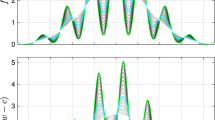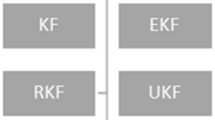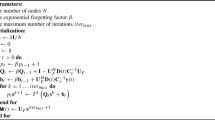Abstract
The traditional identification algorithms are generally based on the quadratic criterion functions and perform well under the interference of Gaussian noise. However, their performances become worse when non-Gaussian impulsive noise is encountered in practical situations. By introducing the maximum correntropy criterion and utilizing its robustness against outliers, this paper develops a robust recursive algorithm for the linear parameter-varying system with the non-Gaussian noise. The algorithm is not only simple and easy to implement, but also can resist the negative influence of the non-Gaussian noise. Moreover, a maximum correntropy criterion-based robust hierarchical algorithm is presented to increase the calculative efficiency. Three simulation examples are provided to demonstrate the validity of the proposed algorithms.











Similar content being viewed by others
Data Availability Statement
Data sharing is not applicable to this article as no new data were created or analyzed in this study.
References
A.K. Al-Jiboory, G.M. Zhu et al., LPV modeling of a flexible wing aircraft using modal alignment and adaptive gridding methods. Aerosp. Sci. Technol. 66, 92–102 (2017)
C. Campbell, Kernel methods: a survey of current techniques. Neurocomputing 48(1–4), 63–84 (2002)
L. Chen, Y.S. Ding, Multiple model approach for nonlinear system identification with mixed-Gaussian weighting functions. Int. J. Model. Identif. Control 28(4), 295–306 (2017)
J. Chen, F. Ding, M.F. Hu, Q.M. Zhu, Accelerated gradient descent estimation for rational models by using Volterra series: structure identification and parameter estimation. IEEE Trans. Circuits Syst. II 69(3), 1497–1501 (2022)
J. Chen, B. Huang et al., Identification of two-dimensional causal systems with missing output data via expectation-maximization algorithm. IEEE Trans. Ind. Inform. 17(8), 5185–5196 (2021)
P.B. Cox, R. Tóth, M. Petreczky, Towards efficient maximum likelihood estimation of LPV-SS models. Automatica 97, 392–403 (2018)
S. Djennounel, M. Bettayeb, Modulating function-based fast convergent observer and output feedback control for a class of non-linear systems. IET Control Theory Appl. 13(16), 2681–2693 (2019)
S.J. Fan, F. Ding, T. Hayat, Recursive identification of errors-in-variables systems based on the correlation analysis. Circuits Syst. Signal Process. 39(12), 5951–5981 (2020)
D. Gidon, H.S. Abbas et al., Data-driven LPV model predictive control of a cold atmospheric plasma jet for biomaterials processing. Control Eng. Pract. 109, 104725 (2021)
A. Golabi, N. Meskin, R. Tóth, J.A. Mohammadpour, Bayesian approach for LPV model identification and its application to complex processes. IEEE Trans. Control Syst. Technol. 25(6), 2160–2167 (2017)
M. Hadian, A. Ramezani, W.J. Zhang, Discretisation of linear parameter-varying state-space representations. Control Appl. Learn. 10(13), 1557 (2021)
B. Hadid, E. Duviella, S. Lecoeuche, Data-driven modeling for river flood forecasting based on a piecewise linear ARX system identification. J. Process Control 86, 44–56 (2020)
L. Janjanam, S.K. Saha et al., Global gravitational search algorithm-aided Kalman filter design for Volterra-based nonlinear system identification. Circuits Syst. Signal Process. 40(5), 2302–2334 (2021)
S.D. Julián M, S.L. Julián J et al., Autonomous ground vehicle lane-keeping LPV model-based control: dual-rate state estimation and comparison of different real-time control strategies. Sensors 21(4), 1531–1532 (2021)
V. Laurain, R. Laurain et al., Sparse RKHS estimation via globally convex optimization and its application in LPV-IO identification. Automatica 115, 108914 (2020)
J.M. Li, F. Ding, Identification methods of nonlinear systems based on the kernel functions. Nonlinear Dyn. 104(3), 2537–2552 (2021)
J.M. Li, F. Ding, Fitting nonlinear signal models using the increasing-data criterion. IEEE Signal Process. Lett. 29, 1302–1306 (2022)
Y.S. Li, Y.Y. Wang, F. Albu, A general zero attraction proportionate normalized maximum correntropy criterion algorithm for sparse system identification. Symmetry 9(10), 229 (2017)
Y.S. Li, Y.Y. Wang, R. Yang, F. Albu, A soft parameter function penalized normalized maximum correntropy criterion algorithm for sparse system identification. Entropy 19(1), 45 (2017)
Z. Li, L. Xing, B.D. Chen, Adaptive filtering with quantized minimum error entropy criterion. Signal Process. 172, 107534 (2020)
J. Li, T.C. Zong, J.P. Gu, L. Hua, Parameter estimation of Wiener systems based on the particle swarm iteration and gradient search principle. Circuits Syst. Signal Process. 39(7), 3470–3495 (2020)
W. Liu, P.P. Pokharel, J.C. Principe, Correntropy: properties and applications in non-Gaussian signal processing. IEEE Trans. Signal Process. 55(11), 5286–5298 (2007)
S.Y. Liu, X. Zhang et al., Expectation-maximization algorithm for bilinear systems by using the Rauch–Tung–Striebel smoother. Automatica 142, 110365 (2022)
L.F. Ma, Y. Zhao, Z.D. Wang, J. Hu, Q.L. Han, Probability-guaranteed envelope-constrained filtering for nonlinear systems subject to measurement outliers. IEEE Trans. Autom. Control 66(7), 3274–3281 (2020)
D. Piga, P. Cox, R. Tóth, V. Laurain, LPV system identification under noise corrupted scheduling and output signal observations. Automatica 53, 329–338 (2015)
R. Pogula, T.K. Kumar, F. Albu, Robust sparse normalized LMAT algorithms for adaptive system identification under impulsive noise environments. Circuits Syst. Signal Process. 38(11), 5103–5134 (2019)
A.J. Pronker, D.A. Abbink et al., Estimating an LPV model of driver neuromuscular admittance using grip force as scheduling variable. IEEE Trans. Hum. Mach. Syst. 50(5), 454–464 (2020)
Y. Pu, Y.Q. Yang, J. Chen, Some stochastic gradient algorithms for Hammerstein systems with piecewise linearity. Circuits Syst. Signal Process. 40(4), 1635–1651 (2021)
H. Reza, F. Mohammad, Robust tube-based model predictive control of LPV systems subject to adjustable additive disturbance set. Automatica 129, 109672 (2021)
R. Senthil, K. Janarthanan, J. Prakash, Nonlinear state estimation using fuzzy Kalman filter. Ind. Eng. Chem. Res. 45(25), 8678–8688 (2006)
J.S. Shamma, M. Athans, Guaranteed properties of gain scheduled control for linear parameter-varying plants. Automatica 40(2), 559–564 (1991)
W.L. Shi, Y.S. Li, F. Albu, A norm penalized noise-free maximum correntropy criterion algorithm, in 2019 Asia-Pacific Signal and Information Processing Association Annual Summit and Conference (APSIPA ASC), November 18–21, Lanzhou, China (2019), pp. 1717–1720
P. Song, H.Q. Zhao et al., Robust time-varying parameter proportionate affine-projection-like algorithm for sparse system identification. Circuits Syst. Signal Process. 40(3), 3395–3416 (2021)
R. Tóth, H.S. Abbas, H. Werner, Robust model predictive controller using recurrent neural networks for input–output linear parameter-varying systems. IET Control Theory Appl. 20(1), 139–153 (2012)
V. Vapnik, The Nature of Statistical Learning Theory (Springer, New York, 1995)
X.H. Wang, F. Ding, Modified particle filtering-based robust estimation for a networked control system corrupted by impulsive noise. Int. J. Robust Nonlinear Control 32(2), 830–850 (2022)
X.H. Wang, F. Ding, The robust multi-innovation estimation algorithm for Hammerstein non-linear systems with non-Gaussian noise. IET Control Theory Appl. 15(7), 989–1002 (2021)
X.H. Wang, F. Zhu et al., Bias correction-based recursive estimation for dual-rate output-error systems with sampling noise. Circuits Syst. Signal Process. 39(9), 4297–4319 (2020)
X.H. Wang, F. Zhu, A novel filtering based recursive estimation algorithm for Box-Jenkins systems. Int. J. Control Autom. Syst. 19(12), 3903–3913 (2021)
Y.Y. Wang, Y.S. Li, F. Albu, R. Yang, Group-constrained maximum correntropy criterion algorithms for estimating sparse mix-noised channels. Entropy 19(8), 432 (2017)
S. Wollnack, H.S. Abbas, R. Tóth, H. Werner, Fixed-structure LPV-IO controllers: an implicit representation based approach. Automatica 83, 282–289 (2017)
L. Xu, Separable multi-innovation Newton iterative modeling algorithm for multi-frequency signals based on the sliding measurement window. Circuits Syst. Signal Process. 41(2), 805–830 (2022)
H. Xu, F. Ding, B. Champagne, Joint parameter and time-delay estimation for a class of nonlinear time-series models. IEEE Signal Process. Lett. 29, 947–951 (2022)
L. Xu, F. Ding, Q.M. Zhu, Separable synchronous multi-innovation gradient-based iterative signal modeling from on-line measurements. IEEE Trans. Instrum. Meas. 71, 6501313 (2022)
X.Q. Yang, B. Huang, Y.J. Zhao, Y.J. Lu et al., Generalized expectation-maximization approach to LPV process identification with randomly missing output data. Chemometr. Intell. Lab. Syst. 148, 1–8 (2015)
X.Q. Yang, Y.J. Lu, Z.B. Yan, Robust global identification of linear parameter-varying systems with generalised expectation-maximisation algorithm. IET Control Theory Appl. 9(7), 1103–1110 (2015)
S. Yin, H. Luo, S.X. Ding, Real-time implementation of fault tolerant control systems with performance optimization. IEEE Trans. Ind. Electron. 61(5), 2402–2411 (2014)
X. Zhang, F. Ding et al., State filtering-based least squares parameter estimation for bilinear systems using the hierarchical identification principle. IET Control Theory Appl. 12(12), 1704–1713 (2018)
X. Zhang, F. Ding, Optimal adaptive filtering algorithm by using the fractional-order derivative. IEEE Signal Process. Lett. 29, 399–403 (2022)
Y.H. Zhou, F. Ding, Hierarchical estimation approach for RBF-AR models with regression weights based on the increasing data length. IEEE Trans. Circuits Syst. II 68(12), 3597–3601 (2021)
Y.H. Zhou, X. Zhang et al., Partially-coupled nonlinear parameter optimization algorithm for a class of multivariate hybrid models. Appl. Math. Comput. 414, 126663 (2022)
Acknowledgements
This work was supported by the Key Research Project of Henan Higher Education Institutions (No. 21A413006), Nanhu Scholars Program for Young Scholars of XYNU (No. 2017B67) and Graduate Research and Innovation Fund of Xinyang Normal University (No. 2021KYJJ44).
Author information
Authors and Affiliations
Corresponding author
Ethics declarations
Conflict of interest
The authors declare no potential conflict of interests.
Additional information
Publisher's Note
Springer Nature remains neutral with regard to jurisdictional claims in published maps and institutional affiliations.
Rights and permissions
About this article
Cite this article
Li, Q., Wang, X. The Maximum Correntropy Criterion-Based Robust Hierarchical Estimation Algorithm for Linear Parameter-Varying Systems with Non-Gaussian Noise. Circuits Syst Signal Process 41, 7117–7144 (2022). https://doi.org/10.1007/s00034-022-02116-1
Received:
Revised:
Accepted:
Published:
Issue Date:
DOI: https://doi.org/10.1007/s00034-022-02116-1




